News
News Release
Commencement of full operation of research data management platform "GakuNin RDM,"
to support management/sharing of research data among Japanese academic institutions nationwide
The Research Center for Open Science and Data Platform (*1) (RCOS, Center Director: Kazutsuna Yamaji, Professor, Digital Content and Media Sciences Research Division) of the National Institute of Informatics (NII, Director General: Masaru Kitsuregawa, Chiyoda-ku, Tokyo Japan) has developed a research data management platform called "GakuNin RDM" for systematically managing and sharing prepublication research data, and began its full operation on Monday, February 15th, 2021.
NII developed GakuNin RDM in response to the Japanese government's policy on science and technology, as well as the international trend toward open science. The GakuNin RDM service supports researchers' data management, from daily research activities in the laboratory to publicly funded research projects. In addition to enabling collaborators to manage and share data across organizations, the service can also be linked with various cloud services and research software.
From another perspective, GakuNin RDM is expected to suppress operations that lead to research misconduct owing to a trail management function to record the operation history of research data saved in the system. By preventing research misconduct before research results are published, and by serving as a starting point for research data to be properly published and discovered, GakuNin RDM can support the future development of open science.
In recent years, the importance of data has been increasing in industries as well as in academic fields. The proper management of research data is important for effectively conducting research projects and increasing the transparency of the processes through which results are obtained. Moreover, in today's academic research, which has become highly complex, researchers are required to conduct interdisciplinary research and industry-academia collaborative research with speed and efficiency. As shown by the fact that Japan's science and technology policy (Cabinet of Japan Integrated Innovation Strategy 2020 (*2)) includes goals such as "promotion of advanced data management, including the use of research data generated by publicly funded research activities," the need for a nationwide research data platform has begun to increase.
To meet these new academic demands, since April 2017, the National Institute of Informatics (NII) has been building a new service called GakuNin RDM to support research data management. Necessary functions have been continually expanded in the demonstration experiments that began in January 2019, and GakuNin RDM's full-scale operation for universities and research institutes began on February 15th, 2021.
For more information about this service, please refer to the Information on application for use page.
Information on application for use:https://meatwiki.nii.ac.jp/confluence/display/gakuninrdmusers
GakuNin RDM enables research data to be quickly managed and shared by multiple researchers across organizations. Thus, in addition to being used for individual research activities, it can serve as a hub for joint research, and used flexibly for research projects of various sizes and fields. Moreover, it is highly scalable and can be linked with cloud storage and external tools that are often used by researchers. GakuNin RDM also partakes in the Academic Access Management Federation in Japan (GakuNin)(*3), and allows users to log in to the same environment as usual and use the service even while teleworking or during business trips.
GakuNin RDM features a trail management function that uses time stamps from a third-party time authentication authority, allowing one to prove that the data stored in a system existed at a particular time. This is also a powerful function from the perspective of research integrity. For academic institutions, centralized management of research data on a common infrastructure system can be expected to enhance the data governance of academic institutions. Institutions with GakuNin membership can easily introduce the service to their organization by applying for use and linking access management systems.
Figure 1 shows an example of multiple research groups using GakuNin RDM for research data management and sharing. GakuNin RDM also allows principal investigators to manage the projects conducted by different groups in a list form.
Figure 1: Example of research data management in the laboratory using GakuNin RDM
A comment from Kazutsuna Yamaji, director of NII's Research Center for Open Science and Data Platform:
This service is a "management platform" for managing and sharing research data, which forms a part of a research data platform called the NII Research Data Cloud (NII RDC) (*4), provided by NII.
Thus far, NII's academic content business has provided services that handle research results, such as published papers. In the NII RDC, the repository and discovery platforms have been strengthened to handle research data in addition to offering conventional services, whereas the management platform is a new platform for handling prepublication information that is still being researched. It represents a major transformation of business for us.
GakuNin RDM is expected to become a service that is closer to the everyday lives of researchers. We would like to develop GakuNin RDM so that it becomes part of everyday research life, in the same way that the Science Information Network (SINET)(*5) is now indispensable to research.
The goal of GakuNin RDM is to make the daily management of research data more convenient and to become a place where research collaborations are created. We will also strive to expand its functionality so that the voices of researchers and those involved in research data management for organizations are reflected more.
News Release: PDF
Commencement of full operation of research data management platform "GakuNin RDM"
- (*1) Research Center for Open Science and Data Platform: In response to the global momentum toward open science, this research center was established within NII in April 2017, in order to develop and operate an academic platform that could serve as an infrastructure for open science. It is expected that, through the wide sharing of academic papers and research data in academia and society, and a wide range of research activities being carried out openly, research activities will be accelerated, problem solving based on close cooperation with society will be promoted, and that this will push academic activities to a new dimension (open science).
See https://rcos.nii.ac.jp/en/ for details. - (*2) Cabinet of Japan Integrated Innovation Strategy 2020:https://www8.cao.go.jp/cstp/english/
- (*3) Academic Access Management Federation in Japan (GakuNin): The Academic Access Management Federation in Japan is a federation consisting of universities that use academic e-resources and the institutions, publishers, etc., that provide these e-resources. By trusting the policies of the federation, institutions are able to realize mutual cooperation with regard to access management.
See https://www.gakunin.jp/en for details. - (*4) NII RDC(NII Research Data Cloud): An information infrastructure is provided by NII, where research data and related materials generated by the academic research activities can be managed, stored, and discovered. It consists of a management platform (GakuNin RDM), repository platform (WEKO3), and discovery platform (CiNii Research), which are independent from one another.
Repository platform: https://rcos.nii.ac.jp/en/service/weko3/
Discovery platform: https://rcos.nii.ac.jp/en/service/research/ - (*5) Science Information Network (SINET): SINET is an information and communication network constructed and operated by NII to serve as an academic information platform for universities and research institutes across Japan.
See https://www.sinet.ad.jp/en/top-en for details.


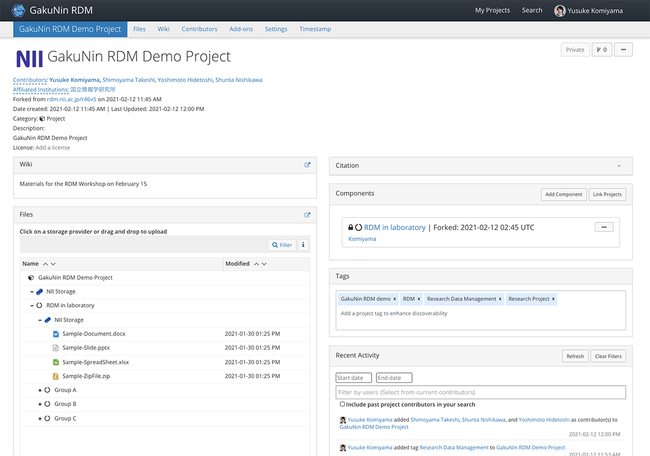
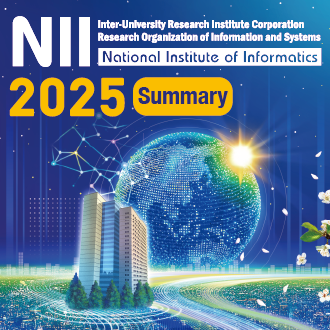 Summary of NII 2024
Summary of NII 2024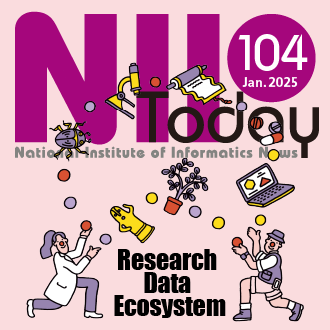 NII Today No.104(EN)
NII Today No.104(EN) NII Today No.103(EN)
NII Today No.103(EN)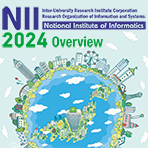 Overview of NII 2024
Overview of NII 2024 Guidance of Informatics Program, SOKENDAI 24-25
Guidance of Informatics Program, SOKENDAI 24-25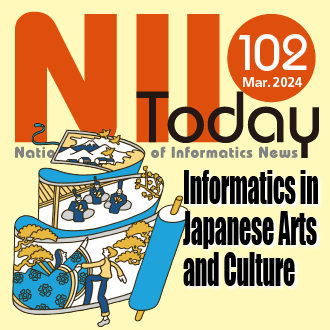 NII Today No.102(EN)
NII Today No.102(EN) SINETStream Use Case: Mobile Animal Laboratory [Bio-Innovation Research Center, Tokushima Univ.]
SINETStream Use Case: Mobile Animal Laboratory [Bio-Innovation Research Center, Tokushima Univ.] The National Institute of Information Basic Principles of Respect for LGBTQ
The National Institute of Information Basic Principles of Respect for LGBTQ DAAD
DAAD
